The rotation of the planet affects the seasons.The seasons influence the weather. The weather impacts the quality of the soil. All three determine when grapes are harvested. In short, nature has a deciding hand in the making of a wine.
Gérard Bertrand respects this fundamental principle in life and in wine making. After all, if nature is the guiding force governing the growth and development of all organic things, why not let nature take its course from start to finish? Why adulterate wines with chemicals and introduce machines that potentially over process grapes when using biodynamic methods of wine production will yield the best quality of wines while preserving the environment?
Gérard Bertrand’s wines at his various vineyards, including Château L Hospitalet and Clos d Ora in the Languedoc Roussillon South of France, are biodynamically produced. Biodynamism takes different forms but Gerard Bertrand is committed to preserving the land and vines from start to finish. This means the process is completely natural for some vintages. The soil is turned by horse and mule, the grapes are planted and harvested by hand, the grapes are not treated with chemicals and nothing artificial is introduced into the wine at any time before bottling. Not all biodynamically produced wines are created equal. Gerard Bertrand has paved the way for “connections between mineral, vegetable, animal and human” biodynamic wine production by promoting biodynamic methods throughout the region of Languedoc Roussillon.
A tasting of two Rose’s, two Chardonnays and two red blends at Daniel Restaurant demonstrated the difference between biodynamic wines and other wines.
A first course of Peekytoe Crab Stuffed Zucchini Flower with Basil Pistou, Tomato Confit and Nicoise Olive was paired with a Château La Sauvageonne Rose’ ‘WW’ 2014, AOP Coteaux du Languedoc and the Château La Sauvageonne Rose’ ‘GMW’ 2014, AOP Coteaux du Languedoc. The first vintage was particularly fresh with a floral bouquet and notes of apricots and hints of strawberries. There are few better candidates for summer wine drinking on a rooftop or as an accompaniment to a cold seafood platter.
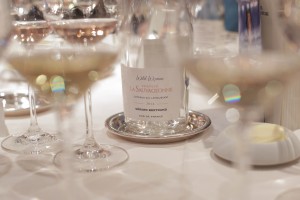
The next course, a Grilled Arctic Char with Young Turnips, Confit Potato, Swiss Chard, French Breakfast Radish and Sweet Garlic Jus was accompanied by a Domaine de Cigalus White, 2011, IGP Aude Hauterive and Chateau L Hospitalet, White, 2014, AOP Coteaux du Languedoc La Clape. The second vintage was especially balanced with just the right amount of oak to create a complexity in an otherwise soft and supple wine with expressive notes of ripe summer fruit.
The third course of a Duo of Beef, Imperial Wagyu Tenderloin, Gourgane Crepe, Smoked Bone Marrow, Fava Beans, Porcini, Black Angus Short Ribs and Chermoula Carrot Mousseline was complemented by Gerard Bertrand’s most exclusive vintage Clos d Ora, 2012 AOP Minervois La Liviniere.
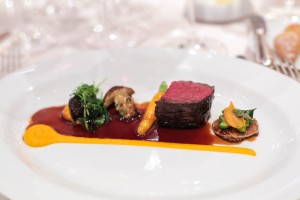
Clos d Ora, cultivated at La Liviniere in Minervois, represents the first vintage created using the This fifteen year labor of love is a blend of Syrah, Grenache, Mourvedre and Carignan. It spent twelve months in French oak. Wine production follows the lunar calendar, the Physics of motion are applied to the processing of the grapes and flower days dictate when the grapes are picked. The result is a wine for the ages. Clos d Ora is pure on the palate, balanced, soft, round and full of ripe red fruit. This vintage demonstrates what the earth can yield when it is nourished and cultivated with extra care.
Lunch ended on a sweet and indulgent note with a Warm Guanaja Chocolate Coulant with Liquid Caramel, Fleur de Sel and Milk Sorbet that could only be served with a Legend Vintage, 1955, AOP full of honey and a richness that can come only with age. It was a treat in itself.
During the course of the lunch I noticed that these wines not only tasted but felt different. After about one glass I began to feel the effects of the wine. I could feel a calm settling in and I felt a very subtle mellowing of the senses. Most wines have the same effect but I have to say I noticed a difference that could best be described as gentler and softer. I can only attribute these differences to the absence of impurities. Naturally drinking two bottles of any wine will nullify any benefits that come with drinking even naturally produced wines but other than that I can only conclude that biodynamic wines are simply better on the palate and in the system.
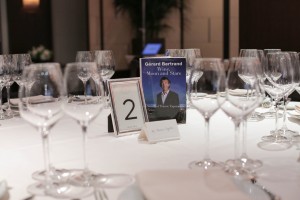


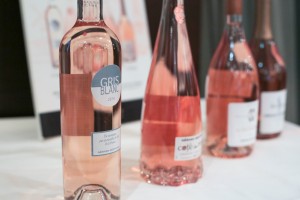

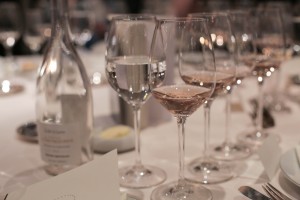

Be First to Comment